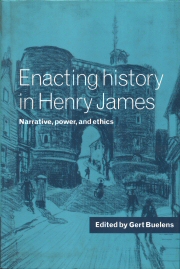Book contents
- Frontmatter
- Contents
- Notes on contributors
- Acknowledgments
- List of abbreviations
- Introduction
- 1 Power relations in the novels of James: the ‘liberal’ and the ‘radical’ version
- 2 Multiple germs, metaphorical systems, and moral fluctuation in The Ambassadors
- 3 James and the ethics of control: aspiring architects and their floating creatures
- 4 James and the shadow of the Roman Empire: manners and the consenting victim
- 5 ‘What Maisie knew’: Henry James's Bildungsroman of the artist as queer moralist
- 6 The double narrative of ‘The Beast in the Jungle’: ethical plot, ironical plot, and the play of power
- 7 Homoeroticism, identity, and agency in James's late tales
- 8 ‘A provision full of responsibilities’: senses of the past in Henry James's fourth phase
- 9 Possessing the American scene: race and vulgarity, seduction and judgment
- 10 History, narrative, and responsibility: speech acts in ‘The Aspern Papers’
- Index
5 - ‘What Maisie knew’: Henry James's Bildungsroman of the artist as queer moralist
Published online by Cambridge University Press: 02 February 2010
- Frontmatter
- Contents
- Notes on contributors
- Acknowledgments
- List of abbreviations
- Introduction
- 1 Power relations in the novels of James: the ‘liberal’ and the ‘radical’ version
- 2 Multiple germs, metaphorical systems, and moral fluctuation in The Ambassadors
- 3 James and the ethics of control: aspiring architects and their floating creatures
- 4 James and the shadow of the Roman Empire: manners and the consenting victim
- 5 ‘What Maisie knew’: Henry James's Bildungsroman of the artist as queer moralist
- 6 The double narrative of ‘The Beast in the Jungle’: ethical plot, ironical plot, and the play of power
- 7 Homoeroticism, identity, and agency in James's late tales
- 8 ‘A provision full of responsibilities’: senses of the past in Henry James's fourth phase
- 9 Possessing the American scene: race and vulgarity, seduction and judgment
- 10 History, narrative, and responsibility: speech acts in ‘The Aspern Papers’
- Index
Summary
What Maisie Knew traces an exemplary path from pained and mystified powerlessness to expert, responsible knowing. Beginning as the poorly informed captive of others’ wills, the heroine grows into a free moral agent, both wiser and abler than those who should have doomed her, in all probability, to evasive victimhood.
James told this basic story again and again, from The Portrait of a Lady to The Golden Bowl. The version we get in Maisie, however, is a very special case. James's one novel about a child's growing up was written at a time when he himself was painfully recrafting his career, style, and sense of audience, and also (not incidentally) moving out of London. He wrote with a sharp, mordant deliciousness that surpassed his previous bouquets of tightly packed flavours, and along with his new tonalities he brought in a level of sensational action he had mostly avoided. The book seems ‘late’, ‘modern’, particularly in assuming a metropolitan social scene characterized by publicity, loud contrasts, pervasive infidelities, and a degeneration of responsibility.
Twenty years earlier, when James's parents were still alive and he was surer of the world and his place in it, he expressed the view that ‘it is good for [children] to feel that the people and things around them that appeal to their respect are beautiful and powerful specimens of what they seem to be’ (LC-l, 196).
- Type
- Chapter
- Information
- Enacting History in Henry JamesNarrative, Power, and Ethics, pp. 93 - 108Publisher: Cambridge University PressPrint publication year: 1997



